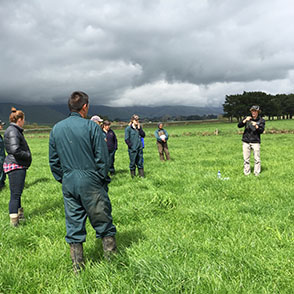Making a career in New Zealands economic backbone
On any given day you’ll find Scott Cameron advising his clients on matters of finance, sustainability, human resources, pasture management and more, with no two workdays being the same.
“It’s a diverse role for sure,” says Scott, who works as a Consulting Officer for Dairy NZ. “I’m not sure I’d have the same level of responsibility, variety and career opportunity in any other industry, but because I work in the agricultural sector there’s a satisfaction of knowing that there’s always innovation, research and investment happening - which creates more opportunities.”
Scott notes that anyone who is unfamiliar with the agricultural sector might be surprised with the range of activity and career paths available, but he says that when you consider it’s the largest part of New Zealand’s economy - worth billions in exports each year – it makes a lot of sense.
“Without a doubt it’s a great industry to work in,” says Scott. “It’s the backbone of New Zealand’s economy, full of options and a wide range of careers. Regardless of your educational background or interests – whether it’s business, communications, science or hands-on farming – there is the opportunity to add real value to the economy and make a significant impact.”
Scott stepped straight into his current role after graduating from Massey University with a Bachelor of Agricultural Science. During his third year of study he was fortunate to receive additional assistance towards his career goals, in the form of a Ballance Agri-Nutrients one-year scholarship valued at $4,000.
“It helped a lot having a trusted New Zealand company behind me. Whereas other scholarships are happy to support your studies, Ballance looks to support your career.”
The scholarship helped to minimise Scott’s student loan and pay for course costs, but it also opened up a range of job possibilities which relieved a lot of stress in his final year and allowed him to focus more on his studies.
“The scholarship provides a perfect pathway into the industry for students from any background, setting you up with the right contacts and exposing recipients to opportunities you otherwise might not have considered,” says Scott.
His advice for any applicants is to “talk to someone in the industry and develop some ideas of the opportunities for innovation and change you’d like to be a part of – regardless of your background or role – think about what value you could bring and what you’d like to do with your career.”
